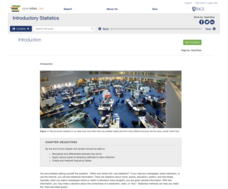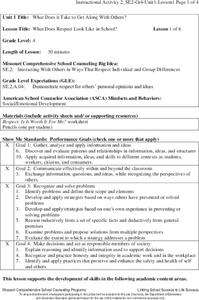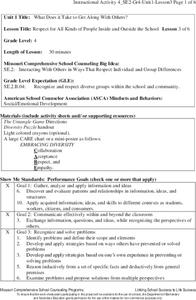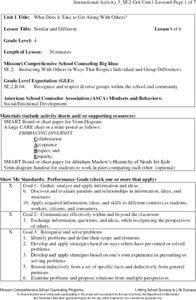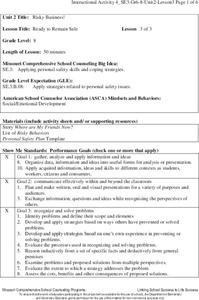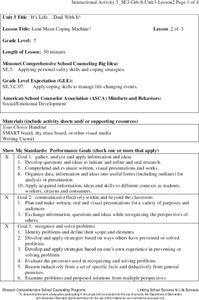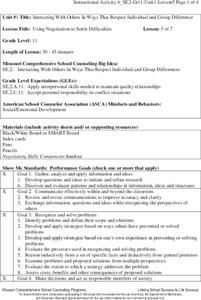Beyond Benign
Can You Hear Me Now? Cell Phone Accounts
How sustainable are cell phones? Throughout the unit, learners explore the issues around cell phones concerning sustainability. Class members take a graphical look at the number of cell phones across the world using a box-and-whisker...
Library of Virginia
Life as a Liberated People
Imagine having no control over your life and then suddenly having to provide for yourself. Such was the challenge faced by many American slaves after emancipation. Class members are asked to consider these challenges are they examine...
NPR
The History of America’s Weed Laws
To understand the laws regarding marijuana use in the United States, you can go all the way back to the 1800's to learn about farming hemp, or you can go back to 2018 when California became the sixth state to legalize recreational...
American Statistical Association
How Random Is the iPod’s Shuffle?
Shuffle the resource into your instructional activity repertoire. Scholars use randomly-generated iPod Shuffle playlists to develop ideas about randomness. They use a new set of playlists to confirm their ideas, and then decide whether...
State Bar of Texas
Roe v. Wade
At what point does the right of privacy end and the government begin? Scholars research rights under the Ninth Amendment to the Constitution. Using the 1973 Roe v. Wade Supreme Court case as a starting point, along with small group work...
Rice University
Introductory Statistics
Statistically speaking, the content covers several grades. Featuring all of the statistics typically covered in a college-level Statistics course, the expansive content spans from sixth grade on up to high school. Material comes from a...
Missouri Department of Elementary
What Does Respect Look Like in School?
What does it mean to be respectful? Scholars complete a self-assessment worksheet to determine just how respectful they are. Next, they choose three items from the survey and write plans for how to improve in those areas.
Missouri Department of Elementary
What Does Respect Look Like at Home?
Individuals consider why is it important to respect family members as they complete a self-respect survey to assess their respectful behaviors at home. They then choose three items from the survey and write about how they plan to improve...
Missouri Department of Elementary
How We Are Alike And Different
Scholars develop social awareness by exploring the concept of similarities and differences. Learners examine two beverages and use a Venn diagram to identify similarities and differences. They tally each item to identify if they are more...
Missouri Department of Elementary
Respect for All Kinds of People Inside and Outside the School
Why is it important to embrace diversity? Scholars explore the topic by learning about the CARE acronym: Collaboration, Acceptance, Respect, Empathy. They also complete a diversity puzzle worksheet and play a collaborative game that...
Missouri Department of Elementary
Similar and Different
Using a Venn diagram, pupils compare the similarities and differences between two classmates. Next, they review the CARE acronym (Collaboration, Acceptance, Respect, Empathy) and discuss how it applies to diversity in the classroom.
Missouri Department of Elementary
Talk it Over and Work It Out: Compromise!
Stop, Think, Act, Review! Scholars use the STAR method to role play two conflict resolution scenarios about childhood problems such as jealousy or cheating. Then, the larger group judges each case to determine if the compromise is a...
Missouri Department of Elementary
Putting on Armor
Peers can exert tremendous pressure that can lead to positive and negative consequences. To conclude the Risky Business unit, class members create a Personal Safety Plan. They list things or situations that cause stress, things they have...
Missouri Department of Elementary
Life … Bring It On!
To conclude the study of coping skills, class members create a collage that identifies and celebrates their strengths that support their ability to make good decisions.
Missouri Department of Elementary
Lean Mean Coping Machine!
Seventh graders are asked to choose and rank five scenarios from a list of ten that are most important to them. After explaining the reasons for the choices, they then identify the coping skills they used to make their decisions.
Missouri Department of Elementary
Managing Conflicts
Conflicts happen. Learning how to manage conflicts in mature and positive ways is an important part of social-emotion growth. The instructional activity offers insight into behaviors that exacerbate conflicts as well as suggestions for...
Missouri Department of Elementary
Using Negotiation to Settle Difficulties
Negotiating can be a win/win experience if the involved parties apply the skills and techniques offered in a lesson plan about negotiating to settle differences.
Missouri Department of Elementary
The Clique
Mean girls and bully packs are favorite topic for films and TV shows that focus on the destructive power of cliques. High school freshmen are asked to reflect on both the positive and negative aspects of cliques by reading a short...
EngageNY
Forming a Research-Based Claim: Cascading Consequences Chart
Can you put that in writing? Scholars work with a partner to write a practice claim before writing their own claims. After writing their claims, learners share with class using a Concentric Circles activity.
Curated OER
Torts: Intentional Torts
Students are introduced to the concept of intentional torts. In groups, they compare and contrast civil and criminal wrongs committed by people. They are given case studies and use the elements of torts to apply to them. They share their...
Curated OER
Comparing Themes Across Texts
Read various texts to compare the themes across each text. Learners write a journal entry describing the most beautiful scenery they've seen and use a map of the United States to locate the Sequoia National Park and Muir Woods. They then...
Shmoop
ELA - Literacy.CCSS.ELA-Literacy.RST.9-10.6
Key to understanding scientific or technical texts is identifying the underlying question the author is attempting to answer. Provide your young scientists with an opportunity to practice identifying these questions and the procedures...
Curated OER
Worth a Thousand Words: Depression-Era Photographs
Students view images of New Deal programs to see its successes. They work in groups to create captions for the images and suggest captions that might indicate different meanings.
Curated OER
Introducing Literary Elements in Fiction
Identify literary elements in fiction. In this reading comprehension lesson, learners read the book Pigsty and record literary elements onto a graphic organizer. They specifically discuss the main characters and events in the text.







